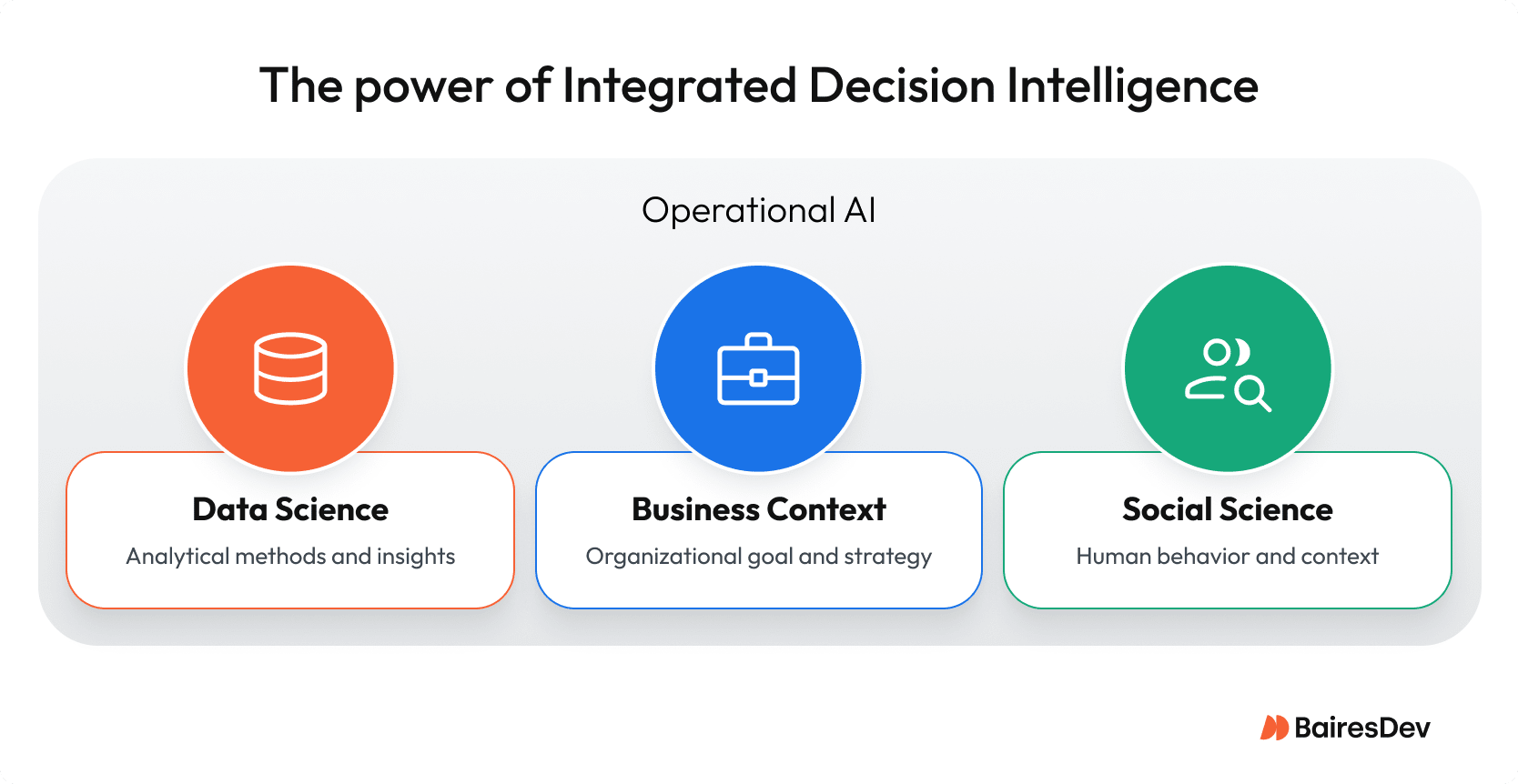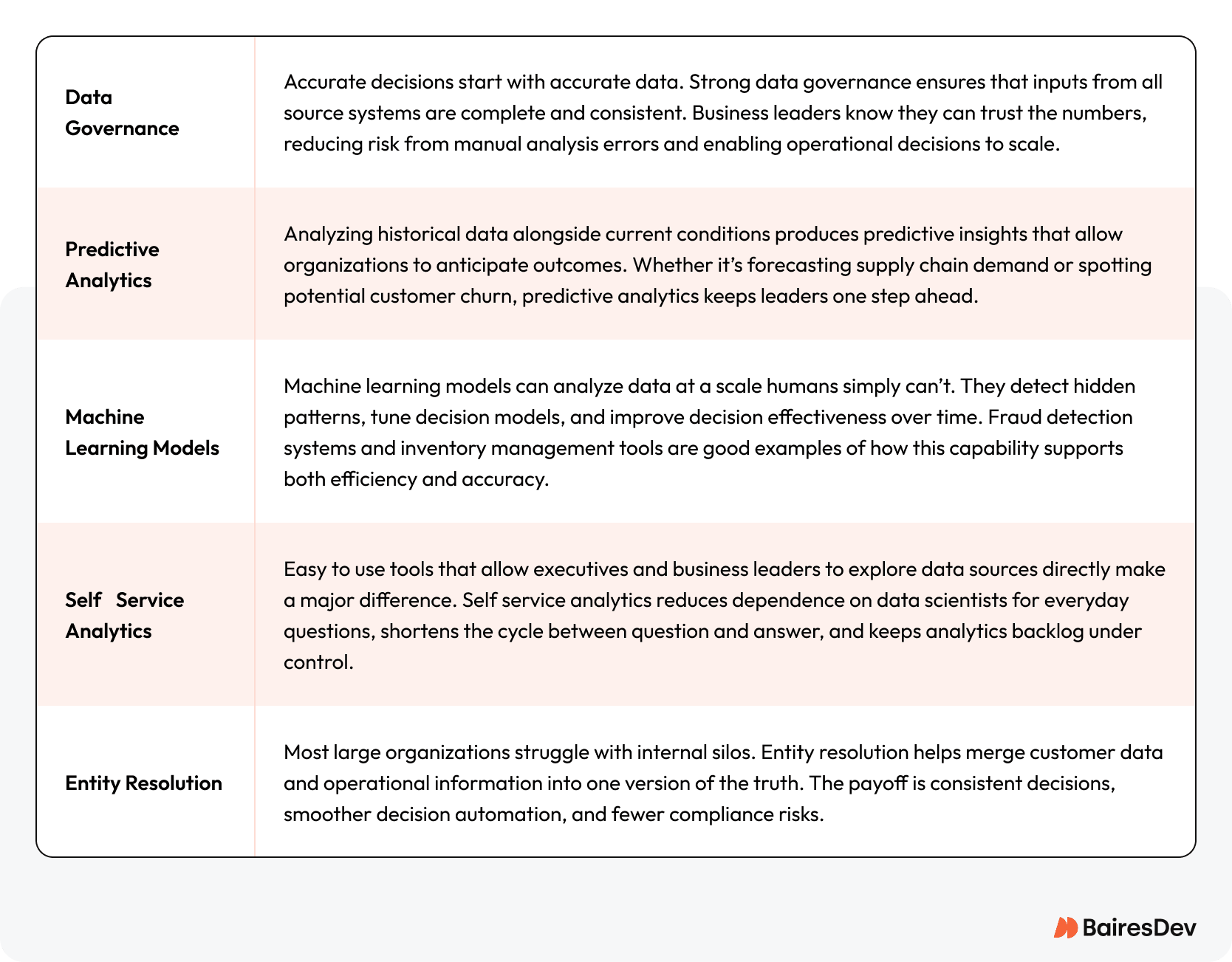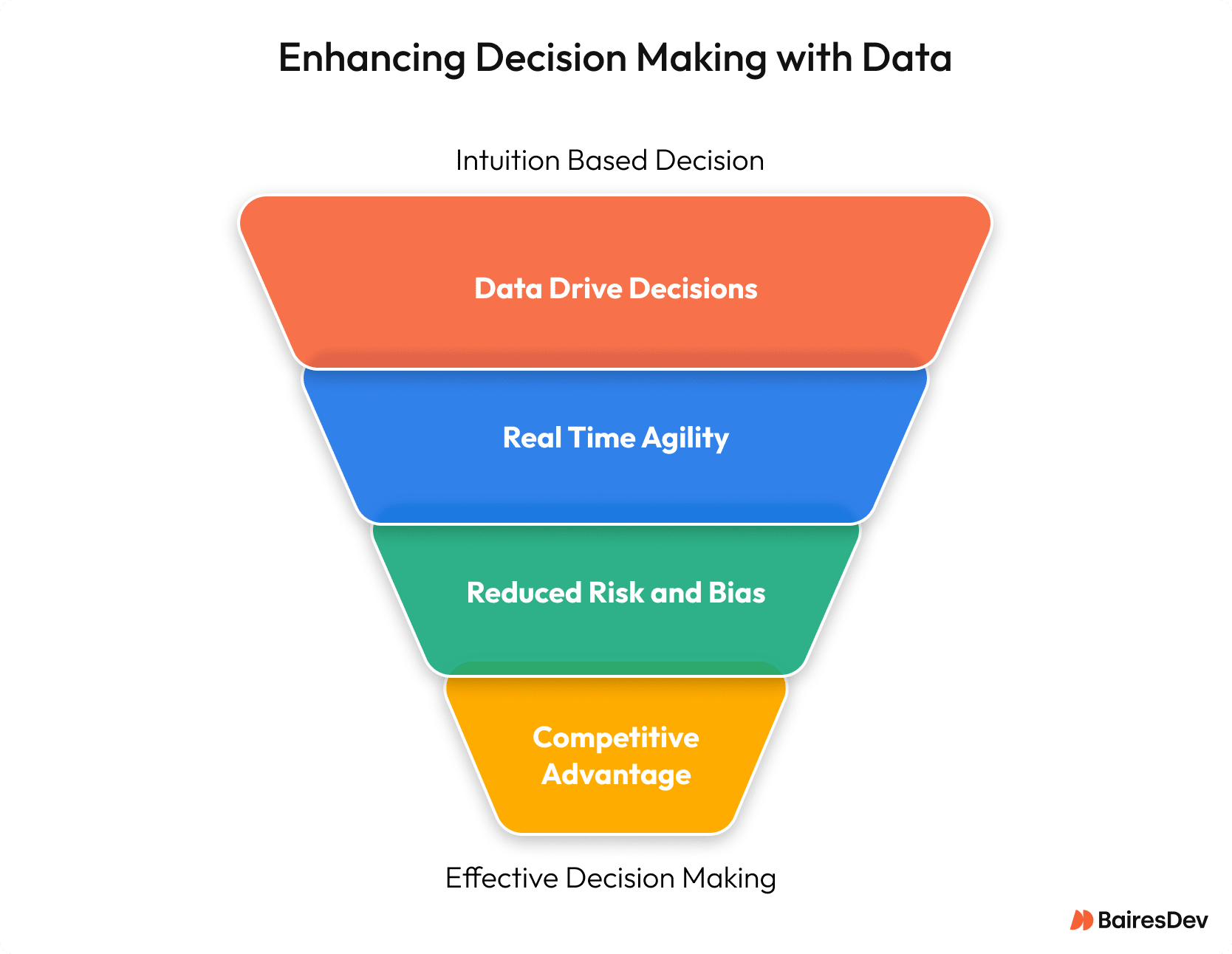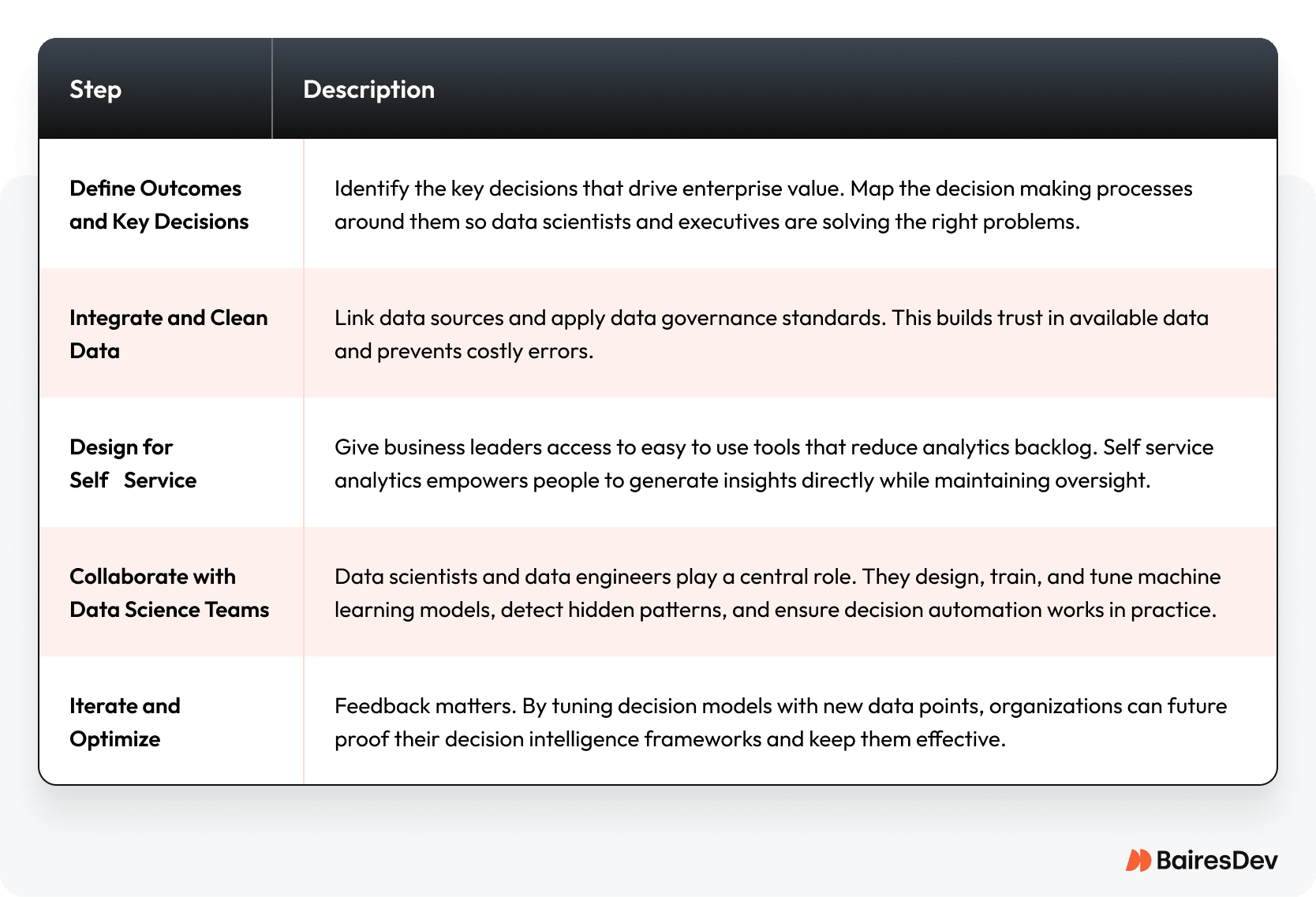For commercial decision makers—whether they’re VPs of Engineering, CTOs, or Heads of Product—the challenge is constant: deliver faster, scale without overspending, and make decisions with confidence. Traditional business intelligence tools can tell you what has already happened, but they don’t always help with the next move.
Decision intelligence represents the next evolution of business intelligence. It shifts the focus from backward-looking reports to data-driven decision making supported by artificial intelligence and machine learning. Gartner reports that, in 2024, over a third of large organizations have incorporated decision intelligence into their strategy.
Unifying data science, social science, and business context through leveraging operational AI, the trend is here to stay. The aim is simple: give business leaders access to better data points, predictive analytics, and actionable insights they can trust.
This convergence of disciplines is more than a technical integration—it’s a redefinition of how decisions are conceived, tested, and executed at scale. By linking the precision of ML models with the pragmatism of enterprise operations, organizations can turn data into an engine for strategic advantage.

Decision intelligence changes how organizations think about decision making processes. Not just about models or dashboards, decision intelligence is about building a framework that allows leaders to analyze data quickly, evaluate future outcomes, and act with more certainty than ever before.
The Meaning of Decision Intelligence
Traditional BI tools often fail to guide future outcomes. Decision intelligence represents a bridge between descriptive reporting and proactive guidance, applying machine learning models and advanced analytics to model scenarios, predict impacts, and recommend optimal paths forward.
For leaders under delivery pressure, that means replacing gut feel with data driven insights—not just dashboards, but targeted decision support embedded in workflows. The benefits of decision intelligence include:
- Clarity under complexity: Translating multifaceted decisions into clear, time‑sensitive recommendations.
- Hidden advantage: Surfacing patterns and connections in data sets that would otherwise go unnoticed.
- Objectivity at scale: Reducing biased analysis by grounding actions in objective, available data.
- Cross‑functional consistency: Supporting decisions enterprise‑wide through unified governance.
These benefits don’t emerge by accident—they rely on a deliberate set of technical and organizational capabilities. Understanding these capabilities is the first step toward designing a decision intelligence ecosystem that delivers measurable business value.
Core Capabilities of a Decision Intelligence Framework
Every intelligence platform depends on several critical components. Each one helps analytics leaders and data teams address real-world business challenges.

When these core capabilities are present, decision intelligence unifies technology and process into a working system. It moves from theory into practice and delivers measurable outcomes.
Strategic Value
Decision intelligence isn’t a new tool in the stack. It’s a change in how business decision making happens. For commercial decision makers and analytics leaders, the benefits line up with what matters most.

From Intuition to Data Driven Decisions
Executives gain credibility when they can back up choices with solid data points. Decisions become easier to explain and defend, improving decision effectiveness across the board.
Real-Time Agility
Large organizations often deal with massive amounts of data. The ability to process it quickly changes the game. In supply chain or inventory management, faster decisions translate directly into dollars saved.
Reduced Risk and Bias
Grounding decisions in analytics and machine learning models reduces exposure to biased analysis and prevents costly mistakes. This is as much about efficiency as it is about risk management.
Competitive Advantage
When decision intelligence unifies data science, business intelligence, and domain knowledge, organizations are better prepared to detect market shifts, adapt, and maintain a competitive edge.
Implementation: A Structured Approach
Installing software is easy. Embedding decision intelligence into decision making processes is harder. The following steps show how to align people, processes, and technology.

Skipping this structured approach is one of the biggest reasons implementations stall. Without it, organizations risk inconsistent decisions and underwhelming ROI.
Real‑World Applications
Decision intelligence shows its value in real-world use cases. Some examples:
Recommendation Engines
Using artificial intelligence AI and machine learning, platforms analyze customer data to provide better suggestions, driving engagement.
Product Conceptualization
Predictive analytics informs product design early, helping decision makers adjust before market launch.
Financial Decision Support
Risk scoring and fraud detection rely on decision intelligence important capabilities like entity resolution and predictive insights.
Supply Chain Optimization
Combining historical data with live inputs allows leaders to streamline logistics and improve efficiency
Each of these examples shows how data science teams can generate insights that directly impact both strategy and frontline operations.
Beyond Technology: Cultural Impact
When done well, decision intelligence changes the culture of business decision making. Decisions are no longer isolated events—they’re consistent decisions informed by a living, learning system that integrates multiple disciplines and supports accurate decisions at speed.
This cultural adoption is what helps enable organizations to go beyond immediate wins and embed decision effectiveness into their DNA.
Moving Forward with Confidence
For senior leaders, the conclusion is straightforward: decision intelligence is not just a framework but a strategic asset. It combines business intelligence, artificial intelligence, and human judgment to reduce risk, sharpen decisions, and maintain long-term competitiveness.
Organizations that move early will be better prepared to capture opportunities, tune decision models continuously, and scale decision making processes as digital transformation accelerates.
Frequently Asked Questions
What is the difference between business intelligence and decision intelligence?
Business intelligence explains what has already happened. Decision intelligence represents the next evolution. It uses artificial intelligence AI, machine learning, and natural language processing to model future outcomes, recommend actions, and unify disparate data into actionable insights.
How does decision intelligence improve operational efficiency?
By combining predictive analytics, decision automation, and self-service analytics, organizations reduce manual analysis, shrink the backlog, and let data science teams focus on more valuable work.
What role do data scientists and data engineers play in decision intelligence?
They design the framework, build and maintain machine learning models, enforce governance, and analyze data to uncover hidden patterns. Their work allows organizations to make informed decisions at scale.
How is decision intelligence different from traditional self-service analytics?
Self-service analytics lets leaders query available data. Decision intelligence adds predictive insights, entity resolution, and contextual recommendations, embedding decision support into everyday business decision making processes.
How quickly can decision intelligence deliver ROI?
If governance is strong and data science teams are already in place, measurable impact can appear within months. Early returns often include faster access to predictive insights, reduced analytics backlog, and fewer errors in operational decisions. Over time, the benefits compound as machine learning models tune decision making processes and deliver more accurate forecasts.
What organizational changes are required to implement decision intelligence?
Success depends on alignment. Leaders need to adapt decision making processes to incorporate predictive insights. Data engineers and scientists must work closely with executives to ensure machine learning models serve real business needs. Strong governance across data sources is equally important to maintain trust and consistency.
How does decision intelligence reduce compliance risk?
Entity resolution and strict governance create a reliable record of customer data and operational information. With accurate and auditable data, organizations reduce exposure to compliance fines and regulatory issues. Decision automation also minimizes manual errors that can introduce risk.
Can decision intelligence scale globally?
Yes. A well-designed decision intelligence platform can integrate disparate data sources across regions and support thousands of operational decisions daily. For global organizations, this ensures consistent decisions across markets while respecting local context.
What are common reasons intelligence programs fail?
The most common pitfalls are weak data governance, lack of executive sponsorship, and misalignment between technology and processes. Programs also falter when data science teams are brought in too late, or when leaders don’t fully trust the data points behind the insights. Avoiding these mistakes is as important as choosing the right platform.







